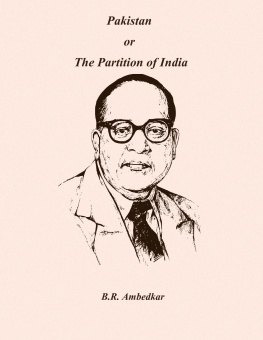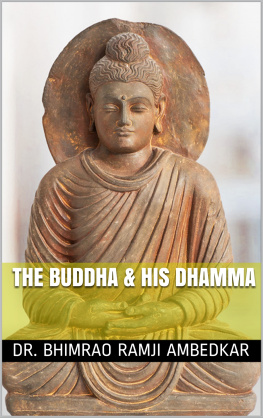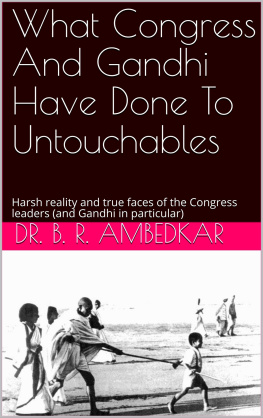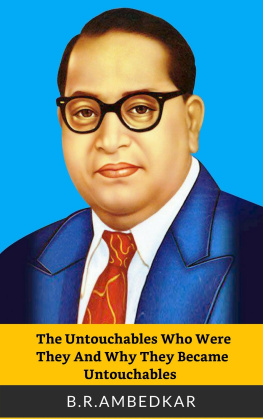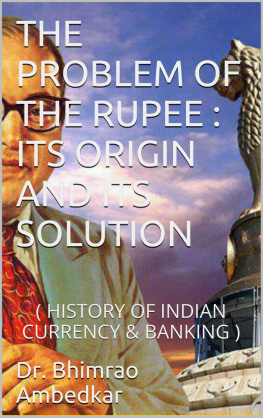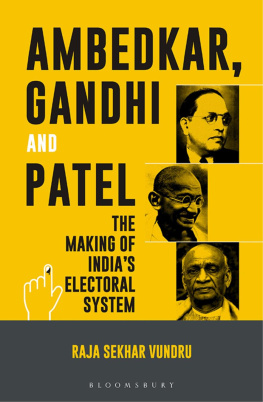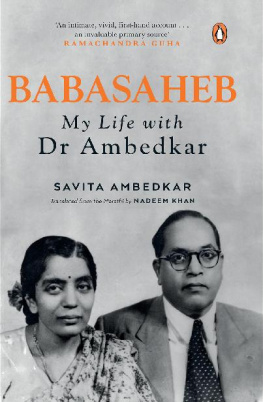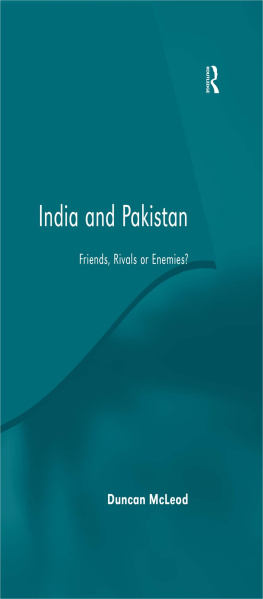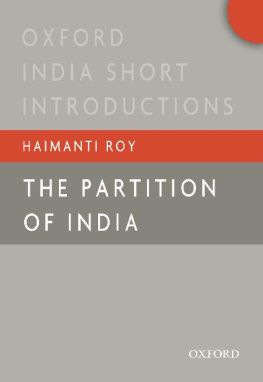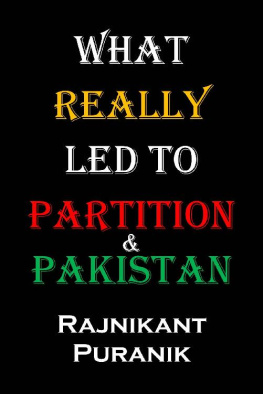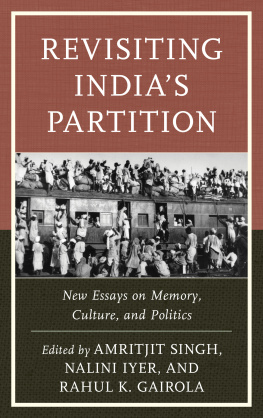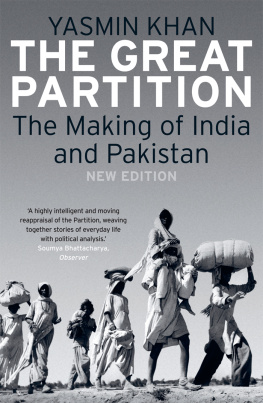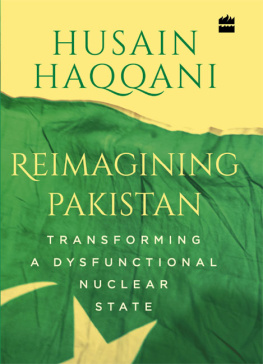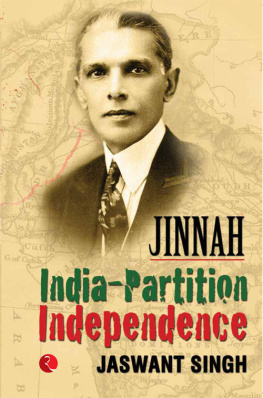PAKISTAN OR THE PARTITION OF INDIA
Dr. B.R. Ambedkar
Table of Contents
PAKISTAN OR THE PARTITION OF INDIA
By Dr. B.R. Ambedkar
_________________________________________________________________________________________
Contents
Chapter I : What does the league demand ?
Chapter II : A nation calling for a home
Chapter III : Escape from degradation
Chapter IV : Break-up of Unity
Chapter V : Weakening of the Defences
Chapter VI : Pakistan and communal peace
Chapter VII : Hindu alternative to Pakistan
Chapter VIII : Muslim alternative to Pakistan
Chapter IX : Lessons from abroad
Chapter X : Social stagnation
Chapter XI : Communal aggression
Chapter XII : National frustration
Chapter XIII : Must there be Pakistan
Chapter XIV : The problems of Pakistan
Chapter XV : Who can decide ?
PREFACE TO THE SECOND EDITION
The problem of Pakistan has given a headache to everyone, more so to me than to anybody else. I cannot help recalling with regret how much of my time it has consumed when so much of my other literary work of greater importance to me than this is held up for want of it. I therefore hope that this second edition will also be the last I trust that before it is exhausted either the question will be settled or withdrawn.
There are four respects in which this second edition differs from the first.
*
readers as well as reviewers. In preparing this edition, I have taken as much care as is possible to leave no room for complaint on this score. ,The first edition consisted only of three parts. Part V is an addition. It contains my own views on the various issues involved in the problem of Pakistan. It has been added because of the criticism levelled against the first edition that while I wrote about Pakistan I did not state what views I held on the subject. The present edition differs from the first in another respect. The maps contained in the first edition are retained but the number of appendices have been enlarged. In the first edition there were only eleven appendices. The present edition has twenty-five. To this edition I have also added an index which did not find a place in the first edition.
The book appears to have supplied a real want. I have seen how the thoughts, ideas and arguments contained in it have been pillaged by authors, politicians and editors of newspapers to support their sides. I am sorry they did not observe the decency of acknowledging the source even when they lifted not merely the argument but also the language of the book. But that is a matter I do not mind. I am glad that the book has been of service to
Indians who are faced with this knotty problem of Pakistan. The fact that Mr. Gandhi and Mr. Jinnah in their recent talks cited the book as an authority on the subject which might be consulted with advantage bespeaks the worth of the book.
The book by its name might appear to deal only with the X. Y. Z. of Pakistan. It does more than that.
It is an analytical presentation of Indian history and Indian politics in their communal aspects. As such, it is intended to explain the A. B.C. of Pakistan also. The book is more than a mere treatise on Pakistan. The material relating to Indian history and Indian politics contained in this book is so large and so varied that it might well be called Indian Political What is What.
The book has displeased both Hindus as well as Muslims though the reasons for the dislike of the Hindus are different from the reasons for the dislike of the Muslims. I am not sorry' for this reception given to my book. That it is disowned by the Hindus and unowned by the Muslims is to me the best evidence that it has the vices of neither and that from the point of view of independence of thought and fearless presentation affects the book is not a party production.
Some people are sore because what I have said has hurt them. I have not, I confess , allowed myself to be influenced by fears of wounding either individuals or classes, or shocking opinions however respectable they may be. I have often felt regret in pursuing this course, but remorse never.
Those whom I may have offended must forgive me, in consideration of the honesty and disinterestedness of my aim. I do not claim to have written dispassionately though I trust I have written without prejudice. It would be hardly possible1 was going to say decentfor an Indian to be calm when he talks of his country and thinks of the times. In dealing with the question of Pakistan my object has been to draw a perfectly accurate, and at the same time, a suggestive picture of the situation as I see it. Whatever points of strength and weakness I have discovered on either side I have brought them boldly forward. I have taken pains to throw light on the mischievous effects that are likely to proceed from an obstinate and impracticable course of action.
The witness of history regarding the conflict between the forces of the authority of the State and of anti-State nationalism within, has been uncertain, if not equivocal. As Prof. Friedmann*
" There is not a single modem State which has not, at one time or another, forced a recalcitrant national group to live under its authority. Scots, Bretons, Catalans, Germans, Poles, Czechs, Finns, all have, at some time or another, been compelled to accept the authority of a more powerful State whether they liked it or not. Often, as in Great Britain or France, force eventually led to co-operation and a co-ordination of State authority and national cohesion. But in many cases, such as those of Germany, Poland, Italy and a host of Central European and Balkan countries, the forces of Nationalism did not rest until they had thrown off the shackles of State Power and formed a State of their own..... "
In the last edition, I depicted the experience of countries in which the State engaged itself in senseless suppression of nationalism and weathered away in the attempt. In this edition I have added by way of contrast the experience of other countries to show that given the will to live together it is not impossible for diverse communities and even for diverse nations to live in the bosom of one
State. It might be said that in tendering advice to both sides I have used terms more passionate than they need have been. If I have done so it is because I felt that the manner of the physician who tries to surprise the vital principle in each paralyzed organ in order to goad it to action was best suited to stir up the average Indian who is complacent if not somnolent, who is unsuspecting if not ill-informed, to realize what is happening. I hope my effort will have the desired effect.
I cannot close this preface without thanking Prof. Manohar B. Chitnis of the Khalsa College, Bombay, and Mr. K. V. Chitre for their untiring labours to remove all printer' sand clerical errors that had crept into the first edition and to see that this edition is free from all such blemishes. I am also very grateful to Prof. Chitnis for the preparation of the Index which has undoubtedly enhanced the utility of the book.
1st January 1945,
22, Prithviraj Road,
B.R.AMBEDKAR
New Delhi.
PROLOGUE
It can rightly be said that the long introduction with which this treatise opens leaves no excuse for a prologue. But there is an epilogue which is affixed to the treatise. Having done that, I thought of prefixing a prologue, firstly, because an epilogue needs to be balanced by a prologue, and secondly, because the prologue gives me room to state in a few words the origin of this treatise to those who may be curious to know it and to impress upon the readers the importance of the issues raised in it.


